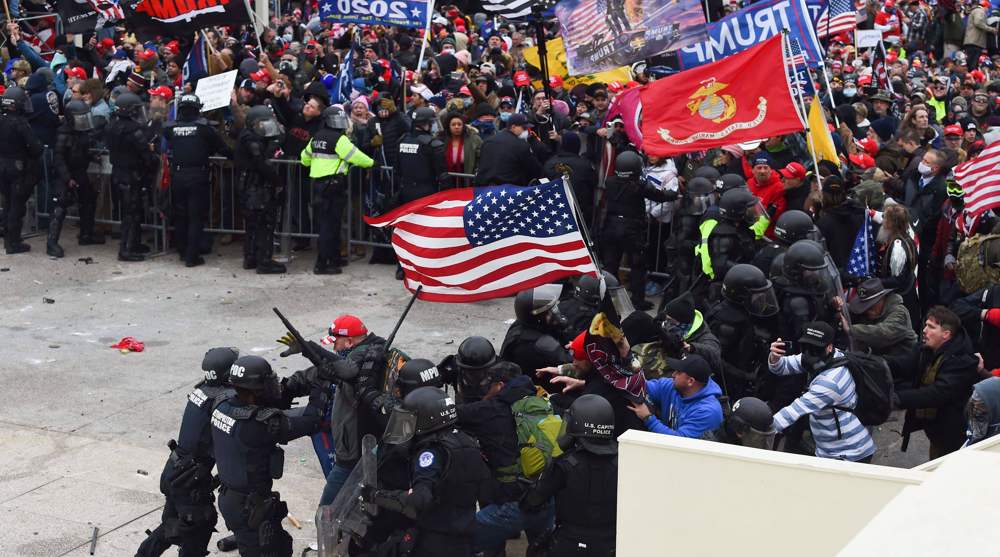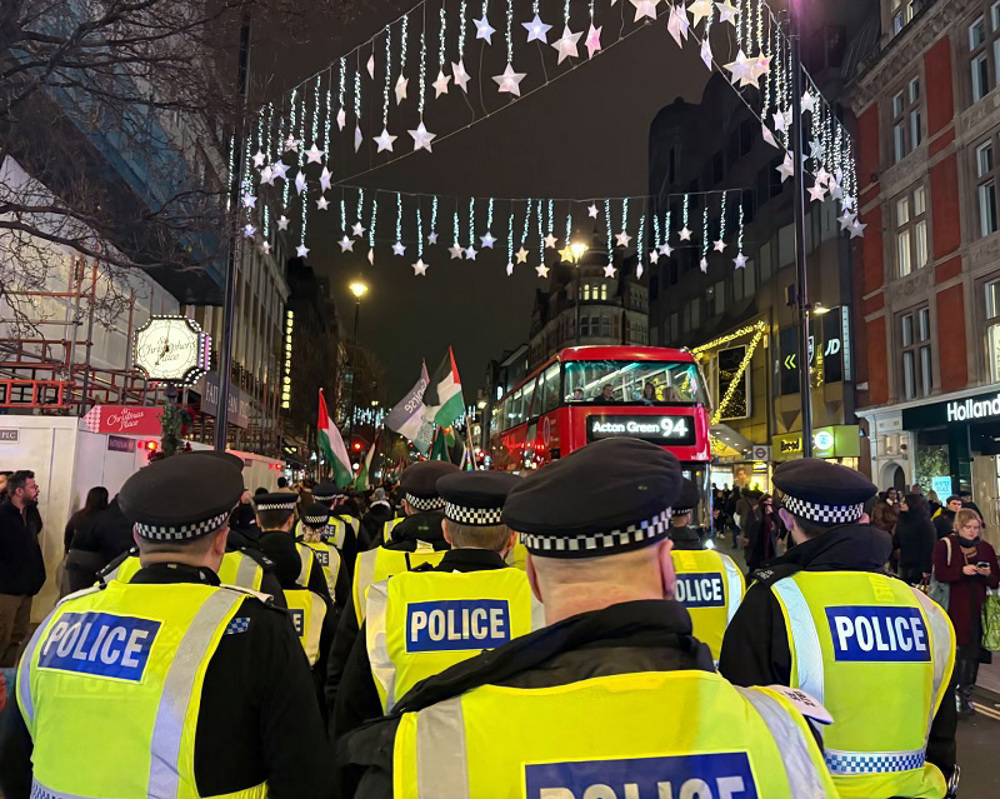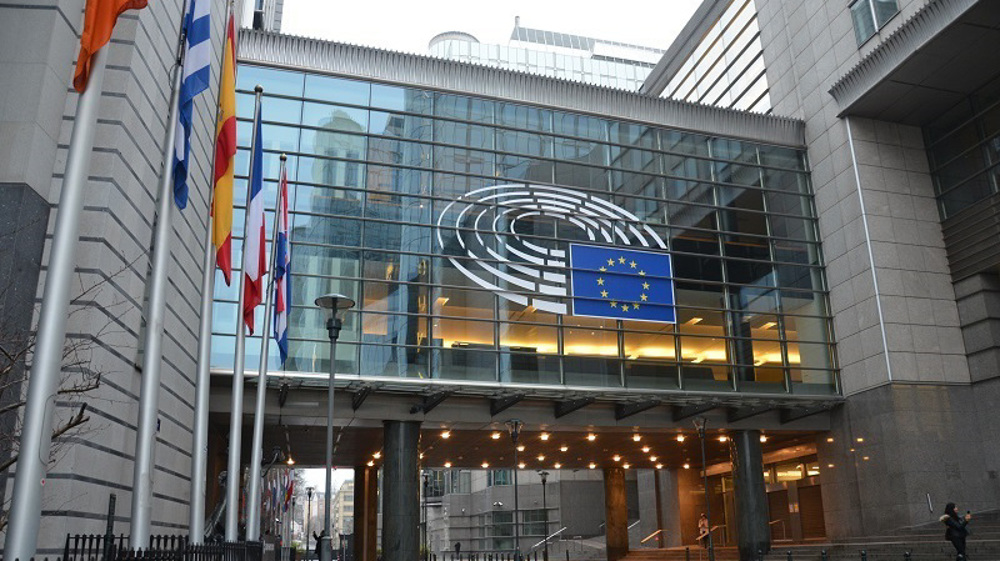2020 began with assassination of Gen Soleimani
The year 2020 was a tough one for Iran due to the efforts of the US government.
Iranian General Qassem Soleimani was assassination by the US government, the very government which prevented medicine and masks from entering Iran amid the coronavirus pandemic.
Iranian professor Fakhrizadeh was also assassinated which apparently was carried out by Israel and with the green light of the US government again.
The White house in transition released two New Year statements.
While outgoing president Trump reflected on what he called his historic victories, President-elect Joe Biden looked to the future with plans for improvements, such as distributing COVID vaccines more quickly.
Trump’s accomplishments include frequently ignoring the severity of the pandemic, and at times even the science behind virus transmission.
Earlier in the year 2020, he presented Iran with a New Year’s gift, the lifeless body of its anti-Daesh General Soleimani.
It was on January the 3rd that Soleimani was assassinated by a US drone-strike in Baghdad.
And then towards the year-end a nuclear scientist, Dr Mohsen Fakhrizadeh, was assassinated.
In-between assassinations, Iran grappled with, and is in fact still grappling with, the coronavirus like the rest of the world, but while under the harshest ever sanctions imposed by the US.
I think the reasons for the murder of General Soleimani are quite obvious. The Americans were frustrated that they were defeated in Syria; they were supporting ISIS, Al-Qaida, so were their allies, they were hoping to undermine Syria; we know that from John Kerry when he said “we allowed ISIS to advance in Damascus to put pressure on President Assad”.
Mohammad Marandi, Professor of North American Studies, Tehran University
Soleimani was martyred after Trump was impeached but before his Senate trial. So it was partly a distraction from the incompetence and criminal behavior of the White House. Trump simply mulled over the decision over a round of Golf, according to Bob Woodward the journalist who authored Rage, a book on President Trump.
Soleimani was plotting imminent and sinister attacks on American diplomats and military personnel; but we caught him in the act and terminated him.
US President, Donald J Trump
This was at a 9 January news conference, a day after the Iranian reaction to the assassination.
Trump contradicted almost immediately by Pompeo
No sooner had he spoken than his own Foreign Secretary Pompeo contradicted him, saying, “There were a series of imminent attacks that were being plotted by Qassem Soleimani. We don’t know precisely when and we don’t know precisely where.”
Apparently, for the land of the brave and the free, that speculation was enough to slay the father and protector against Daesh or ISIS along with his of 9 companions, including a man who enjoyed similar reverence in Iraq, Abu Mahdi Al-Muhandis, the deputy commander of the Hasht ash-Sha’bi paramilitary umbrella group.
We saw Iraqi parliament moved to expel and call on the US to end the occupation and leave and millions of people went to the street and asked the US to leave. Also during the anniversary of the assassination of general Soleimani and Abu Mahdi al-Muhandis again we saw huge crowds in Baghdad on the night of the terror attack as well as during the following day. So the response of the Iraqi people was very different from what we would hear from western and pro western media outlets and think tanks and pundits.
Mohammad Marandi, Professor of North American Studies, Tehran University
Soleimani wasn’t exactly a stereotypical IRGC commander; he had evolved socially as well as militarily. So it wasn’t completely surprising to see women with partially covered hair among the millions of mourners, or to see a policeman quietly weeping as he kept an eye on the procession from above, on the pedestrian bridge.
Soleimani volunteered for the 8-year war of the 80s, which Iraq imposed on Iran with generous help and encouragement from world powers.
Over the US strike on the Qassem Soleimani, Abu Mahdi al-Muhandis and company, Iraq could not remain quiet either.
In the face of growing anger, the Iraqi parliament urged the government to oust the roughly 5,200 American troops stationed in Iraq.
Based on conventions, when a country is even legally have military barracks in another country, but carries out military action in violation of their agreement, the latter’s military presence will be deemed illegitimate. Then, the host nation can reverse their agreement and demand that they withdraw their troops. The US assassination of General Qasem Soleimani in Iraq violated international conventions as well as bilateral agreements. What the US did amounted to a human rights violation.
Abbas Mousavi, former Foreign Ministry Spokesperson
As for the Iranian reaction to the US strike: Ballistic missiles fired at Iraq’s Ein al-Assad base where US forces were stationed. America's inability to defend itself against the air attack, or its unpreparedness, was a great historical humiliation for that superpower that has made West Asia its business more than that of West Asian states themselves.
After the assassination of General Soleimani, the Americans sent us messages through diplomatic channels and we responded to them. They also sent mediators who were making efforts so that the Americans decide the timing and the place of retaliation. One of these mediators said that President Trump was even ready to lift sanctions on Iran in return for no retaliation from Tehran.
Hossein Amir Abdollahian, Intnl. Affairs Adviser to Parliament Speaker
The Americans had no ballistic missile interceptors in range, when on January 8th Iran fired 13 ballistic missiles into Iraq at bases housing American troops, 11 of which hit the Ain-Al-Assad Base. It was a warning, precisely targeted so no American or coalition partners were killed.
On the same day, the 8th of January, a Ukrainian passenger jet was shot down, shortly after takeoff from IKIA airport off Tehran. All 176 people aboard flight PS752 were killed. It was a consequence of expecting a response by the US to the ain-al-assad retaliation.
Iran’s military said it unintentionally downed the plane, mistaking it for a cruise missile, as it turned towards a sensitive site belonging to Iran's IRGC. Ukraine International Airlines denied the plane veered from its expected course before the crash, and said officials should have closed the airport.
Canada’s Foreign Minister Champagne actually alleged he did not believe that the downing of the plane could be “blamed on human error”. Whereas Iran implied there could have been no cover-up, as Canada’s representatives had visited the site of the crash and had participated in the reading of the plane’s black box in Paris.
The reasoning FOR Iran, is pretty straightforward: the downing of the plane was just hours after Iran’s retaliation to the Soleimani assassination, so Iran was expecting a possible reaction by the US.
The downing of the Ukraine passenger plane was tragic but it is clear for any sane person and any fair minded person that the real culprit is the US. We have to remember that trump had threatened to attack Iran and even destroy Iran’s cultural sites. So when the Iranian retaliated for the assassination of gen. Soleimani and fired missiles at the occupation base in Iraq’s Ein al Assad base, Iranians were expecting an american counter attack, so the officer who shot down that place, made a very tragic mistake but there is no doubt that if it wasn’t for the murder of gen. Soleimani, if it wasn’t for US’s constant threats to destroy Iran by Trump, it would never have happened.
Mohammad Marandi, Professor of North American Studies, Tehran University
On February the 21st elections for the new 11th Parliament were held, with the following result: 40 independents, 19 reformists and moderates, and as many as 220 Principlists were elected!
Voters opting for Principlists wanted a more decisive approach towards weak western’s compliance with the JCPOA.
Blocking the transfer of medicine: genocide on the sly
Sanctions have been placed on medicine in addition to banking so that Iran can’t pay for medicine, raw materials and medical equipment, despite the United Nations Human Rights Commissioner having called for the “urgent” reevaluation of sanctions against countries grappling with the global pandemic.
The US is responsible for the subsequent hardship suffered by the general population in Iran.
The Corona virus disease (COVID-19) was first reported from Wuhan, China, on December 31, 2019. Iran confirmed its first cases on February the 19th 2020. Those were two SARS-CoV-2 positive cases in the city of Qom. The disease spread rapidly to adjacent provinces, and shortly thereafter to all 31 provinces The Ministry of Health and Medical Education (MHME) took action by establishing the National Committee to Combat Corona.
Iran was not alone in the region in its suffering. West Asian economies contracted by an average of around 5 percent since lockdowns slowed down domestic economic activity and limited global demand. Pandemic-sensitive sectors such as tourism particularly suffered, as did oil prices.
The unemployment and poverty that prevailed before 2020 worsened and is projected to worsen further in 2021. Most regional governments worked hard to manage the crisis, but carnage was unavoidable, given limited fiscal space. Now Iran has had US sanctions, be they legal or not, to deal with on top of the pandemic.
The country has grown resilient to sanctions, which have been ongoing throughout the 40-plus-year life of the revolution. But with the recent maximum pressure campaign, it’s surviving by gasping for air.
Let me describe the situation of some countries around Iran these days. Most of them don't have any equipment or device for detecting this virus. And unfortunately I should say many of these countries don't even have a health care system. They can't even specify the number of the infected people. For example, the health care system in Pakistan and Iraq is much inferior to that of Iran. In Iran, there are many laboratories which try to test this virus and other viruses and our health care system is able to check this virus and give report to the World Health Organization every day.
Dr M R Salehi, Infectious Disease Specialist, Imam Khomeini Hospital
US restrictions on Iran’s banking system and oil exports have limited the country’s ability to finance and purchase essential items from abroad. Most critically, medicine as well as raw materials and equipment needed to manufacture medicine domestically, have also been restricted.
The Trump administration has even reduced, unlawfully, the number of licenses it grants companies for certain medical exports to Iran.
It is not possible to determine to what extent US sanctions have affected Iran’s capacity to fight COVID_19, according to Iranian medical workers and global public health experts.
But it is clear that the country is being deprived of sufficient equipment to save lives and prevent wider infection. It has manufactured much, but sanctions have most certainly reduced Iran’s capacity to control the outbreak.
The US pulled out of the JCPOA, the Joint Comprehensive Plan of Action or Iran Nuclear Deal, in 2018; a deal which was supposed to lift sanction on Iran, in return for Iran limiting its peaceful nuclear program.
Yet in 2020 America proposed a resolution to indefinitely extend the UN arms embargo on Iran. That would necessitated tampering with a provision of the JCPOA, which the US was no longer a party to.
Despite its maximum pressure campaign against Iran, the US, for once, found itself receiving minimal support. The occasion was marked in mid-August as the UN Security Council resoundingly defeated the resolution, leaving Trump’s America with support only from the Dominican Republic.
"In the 75 years of United Nations history, America has never been so isolated", the then Iranian Foreign Ministry Spokesman Mousavi tweeted.
Despite all pressure applied on Iran, it maintained its regional policy vis-à-vis its Middle Easter and Anatolian neighbors with which it has normal ties. Owing to deep-seated ties with neighbors, the country was spared serious economic harm and the economic collapse the US hoped to happen by 2019 did not happen. What is clear is that the Americans have failed in their pressure campaign to bring Iran to its knees.
Kiumars Yazdanpanah, Political Analyst
JCPOA signatory China said: “Should the US insist regardless of international opinion, it is doomed to fail like today…unilateralism receives no support and bullying will fail”... Germany however ended 2020 by saying outright it did not trust Iran.
What might that statement mean for the JCPOA and Iran’s compliance in limiting its nuclear activity?
No one in Iran really cares what the German government thinks or says. Iran is only concerned with the nuclear deal. The Germans and Americans want Iran to implement its obligations under the bargain so, logically, they will have to do the same and implement their side of the bargain.
This is not an act of friendship; this is not a marriage; this is a deal; a deal that was negotiated over years; both sides gave and both sides took.
The Iranian government has faced numerous cases of non adherence by the west, beginning with the US pullout from the JCPOA, and mostly verbal compliance by other western parties to the deal. Not to mention various forms of sabotage, by the US and Israel, in the form of assassinations and nuclear site bombings.
Principlists parliamentarians submitted separate plans to withdraw from the JCPOA and the Additional Protocol to the NPT nuclear proliferation treaty, should it be deemed necessary. Their resolve was intensified by the Natanz explosion and Fakhrizadeh assassination.
The explosion at the Natanz uranium enrichment site was a major highlight of the year. It was an act of sabotage, and a tragedy. The incident caused significant damage that could slow the development of advanced uranium enrichment centrifuges.
Natanz, much of which is underground, is one of several Iranian facilities monitored by the IAEA, the UN nuclear watchdog, which certified 15 times that Iran was in full compliance with the nuclear deal.
That was until Iran was pushed into mincing away from its commitments, however reversibly so.
The most recent of several nuclear personalities assassinated over the years. Mohsen Fakhrizadeh was murdered on 27 November of 2020.
Israel is not unreasonably suspected of assassination, as it had marked the name Fakhrizadeh in addressing the world with accusations against Iran, a few years ago.
I don’t think the statement that the Israeli regime carried out the assassination of Dr Fakhrizadeh is speculation.
It’s pretty clear from trump’s retweets, and from what unnamed senior American officials said to the New York Times, and from other material that has come out. It all shows that the Israelis were involved and ultimately the Israeli regime has to pay the price.
However, the Americans are already paying the price because the (Iranian) parliament has approved a law to expand Iran’s nuclear program as a result of this terrorist attack.
Mohammad Marandi, Professor of North American Studies, Tehran University
Reasons for assassination
In my opinion, there were two goals behind this assassination. It is a general goal that those seeking to restrict Iran's military industry have stepped in to turn their demands into an operational stage and thus assassinate the father of Iran's military industry. This has been a large-scale goal. The second goal was tactical. They seek to force Iran to make a rash reaction to this so-called American administration. Basically, Mr. Trump is working with Israel to make Iran do something that would make it fundamentally impossible to return to the deal.
Hossein Rooyvaran, Political Analyst
Enough is enough
With all the western lack of adherence or weak compliance to their obligations under the JCPOA, the sabotage and assassinations, Iran has decided to put an end to this one-way game.
The Iranian Parliament is resolute it will have the sanctions lifted or ditch the deal. The resolution is named: Strategic Action to Lift Sanctions.
The 1st of December saw MPs approve the outlines of the bill. This followed a phased reduction in Iran’s commitments to the JCPOA, given what President Rouhani called the E3’s support for the constant intensification of cruel American sanctions against Tehran.
The parliament’s act was in response to the assassination of Dr Fakhrizadeh and was a form of punishment. It was telling the US government that when you condone murder, when you give the green light to murder; this is the response you get. But it is also sending a second message and that is to Biden which says to Biden that if you want to implement the nuclear deal, you can do it in day one. Biden can get presidential decrees and reverse everything Trump has done in one day. His lawyers actually could be doing that right now if it is his intention. Iranians are saying that if you do not do so, that means you are playing games and buying time and we are going to expand the nuclear program as a result.
Mohammad Marandi, Professor of North American Studies, Tehran University
The proposed bill
According to the 9-article bill, the Atomic Energy Organization of Iran will be required to produce and store at least 120 kg uranium with 20 percent purity at the Fordow nuclear facility every year to fulfill the country’s peaceful industrial demands.
Also the organization is to increase the monthly output of enriched uranium, for various peaceful purposes with different purity levels, by at least 500 kilograms. And it is to increase the number of centrifuge machines to 1,000 within a year after the ratification of the bill.
The bill also necessitates the inauguration of a metallic uranium factory in Isfahan within a time frame of five months and restoration of a 40 megawatt heavy water reactor in Arak, which was supposed to be redesigned and optimized under the 2015 Iran nuclear deal.
The bill requires the government to prevent any foreign access and monitoring beyond the additional protocol and to suspend the voluntary implementation of the additional protocol to the nuclear non proliferation treaty; NPT, three months after ratification of the law.
Once again, that is if the parties to the nuclear deal between Iran and world powers were to fail to uphold their obligations under the deal.
The fact is that the impacts of the US withdrawal from the JCPOA and the intensification of sanctions on the Iranian society are quite obvious. We no longer accept negotiating on anything other than the nuclear issue. It's very natural - the other side is not trustworthy and has always been so.
Kiumars Yazdanpanah, Political Analyst
Routine IRGC drills rattle Israel as military chief calls CENTCOM commander: Report
Australia trials Israeli weapon system ‘combat-proven’ in Gaza genocide: Report
Pakistan’s Field Marshal Munir awarded Saudi Arabia’s King Abdulaziz medal
Lebanese army uncovers, dismantles Israeli spying device in south
CIA undermining Trump’s Ukraine plan: Ex-US national security adviser
Ten million Persian manuscripts donated from India to institute in Iran
VIDEO | Press TV's news headlines
Iran says defense capabilities not open for negotiations


















 This makes it easy to access the Press TV website
This makes it easy to access the Press TV website